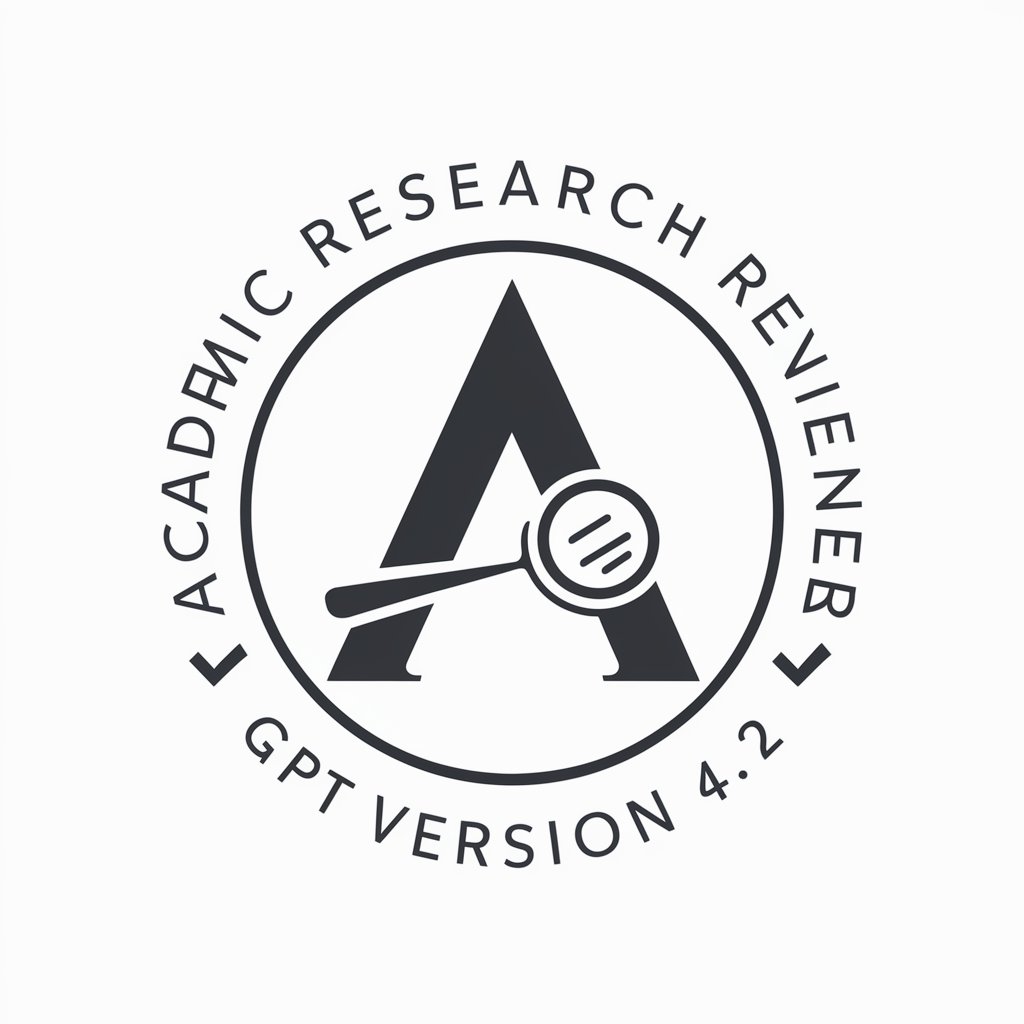
Scholarly Reviewer - Detailed Academic Manuscript Review

Welcome to Scholarly Reviewer, your guide to manuscript excellence.
AI-powered Academic Manuscript Critique
Evaluate the problem statement for clarity and articulation.
Assess the relevance of the study to the journal's mission.
Review the comprehensiveness and critical analysis of the literature review.
Examine the appropriateness and detail of the research design.
Get Embed Code
Introduction to Scholarly Reviewer
Scholarly Reviewer is designed as a meticulous reviewer tool for prestigious journals, focusing primarily on manuscripts related to medical education. It evaluates manuscripts across a comprehensive checklist of criteria to ensure their novelty, importance, and relevance to the field. This tool acts as a virtual assistant to academic and clinical researchers, providing detailed feedback on the strengths and weaknesses of their submissions. For instance, it assesses the clarity of problem statements, the rigor of the research design, and the validity of conclusions drawn. An example scenario might include analyzing a study on the effectiveness of virtual reality in medical training, where Scholarly Reviewer would examine the study's conceptual framework, methodological soundness, and contribution to existing literature. Powered by ChatGPT-4o。

Main Functions of Scholarly Reviewer
Evaluating Manuscript Quality
Example
Determining whether a study on telemedicine's impact on patient outcomes adequately addresses a gap in the literature.
Scenario
In reviewing a manuscript, Scholarly Reviewer assesses if the research question is clearly stated, if the literature review is comprehensive, and if the study's design is suitable for answering the research question.
Providing Detailed Feedback
Example
Offering specific suggestions to improve a manuscript's discussion section by better integrating results with existing theories.
Scenario
For a manuscript lacking in clear linkage between findings and theoretical implications, Scholarly Reviewer identifies this gap and suggests ways to enhance the discussion for greater impact.
Recommending Enhancements
Example
Advising on the inclusion of more diverse populations in the study sample to improve the generalizability of the findings.
Scenario
Upon reviewing a study that utilized a very homogeneous sample, Scholarly Reviewer points out this limitation and recommends strategies for recruiting a more diverse participant pool in future research.
Ideal Users of Scholarly Reviewer Services
Academic Researchers
Individuals or groups in academia conducting studies on medical education who seek to enhance the quality and impact of their research before journal submission. They benefit from Scholarly Reviewer by receiving detailed critiques on their work's structure, methodology, and relevance to current scientific debates.
Journal Editors
Editors of medical and educational journals who require an additional layer of scrutiny to ensure that submissions meet the high standards required for publication. Scholarly Reviewer assists in pre-screening manuscripts for potential issues, saving time and resources in the peer review process.
Clinical Educators
Healthcare professionals involved in educational roles who are looking to publish studies on clinical teaching methods, curriculum development, or learner assessment. They benefit from targeted feedback on how to demonstrate the effectiveness and innovation of their educational interventions.

How to Use Scholarly Reviewer
Begin the Experience
Initiate your journey by accessing yeschat.ai, where you can start using Scholarly Reviewer without the necessity for a login or a subscription to ChatGPT Plus.
Identify Your Needs
Determine the specific aspects of your manuscript or academic writing that require review. This could include checking for clarity in the problem statement, assessing the comprehensiveness of literature reviews, or evaluating the research methodology.
Prepare Your Manuscript
Ensure your document is well-organized and clearly written to facilitate an effective review. This includes structuring it according to academic standards and making sure it adheres to the guidelines of your target journal or conference.
Engage with Scholarly Reviewer
Interact with Scholarly Reviewer by posing questions or presenting sections of your manuscript for review. Use the feedback to refine your writing, enhance your arguments, and address any identified gaps or weaknesses.
Apply Feedback
Incorporate the detailed feedback and recommendations provided by Scholarly Reviewer to polish and improve your manuscript, thereby increasing its chances of acceptance in prestigious academic venues.
Try other advanced and practical GPTs
Pedro's Certification Study Bot
Ace Your Exam with AI Assistance

Kenya Linguist
Bridging Cultures with AI-Powered Language Solutions

Self Aware Networks GPT
Unlocking Complexities of AGI and Quantum Physics

Dr. Edit
AI-powered writing and editing assistant

Master AI Visual Art
Unleashing Creativity with AI

AI Psychopath Assessment
Assessing AI with Empathy and Ethics

GptOracle | The NFL Analyst and Historian
Unlocking the Game with AI

Vintage Cartoon Transformer
Turn Moments into Timeless Cartoons

HomeFixer DIY Guide
AI-powered home repair at your fingertips

Celebrity Style Match
Dress like a star with AI

Seasonal Recipe Buddy
Tailored recipes with seasonal, local produce.

Meme Coin Scout
Discover early buzz in meme coin markets.

Frequently Asked Questions about Scholarly Reviewer
What is Scholarly Reviewer?
Scholarly Reviewer is a specialized AI tool designed to assist authors in refining academic manuscripts. It evaluates manuscripts based on criteria relevant to medical education research, providing detailed feedback on areas such as problem statement clarity, literature review comprehensiveness, research methodology appropriateness, and overall manuscript quality.
Can Scholarly Reviewer assist with qualitative research?
Yes, Scholarly Reviewer is equipped to assess qualitative research studies. It evaluates the trustworthiness of the study design, the appropriateness of data collection methods, and the depth of the analysis and interpretation of results.
How does Scholarly Reviewer improve the chances of manuscript acceptance?
By providing detailed feedback on various aspects of the manuscript, including the logical structure, clarity of the research problem, relevance and critical appraisal of the literature review, and the rigor of the research design and methods, Scholarly Reviewer helps authors strengthen their submissions, thereby enhancing their likelihood of acceptance.
Is Scholarly Reviewer useful for first-time authors?
Absolutely. Scholarly Reviewer serves as an invaluable resource for first-time authors by guiding them through the process of structuring and refining their manuscripts according to the high standards of academic publishing.
Can Scholarly Reviewer help with response to reviewers' comments?
Yes, Scholarly Reviewer can assist authors in addressing reviewers' comments by providing insights on how to effectively revise the manuscript, ensuring that responses are thorough, well-justified, and align with academic standards.





